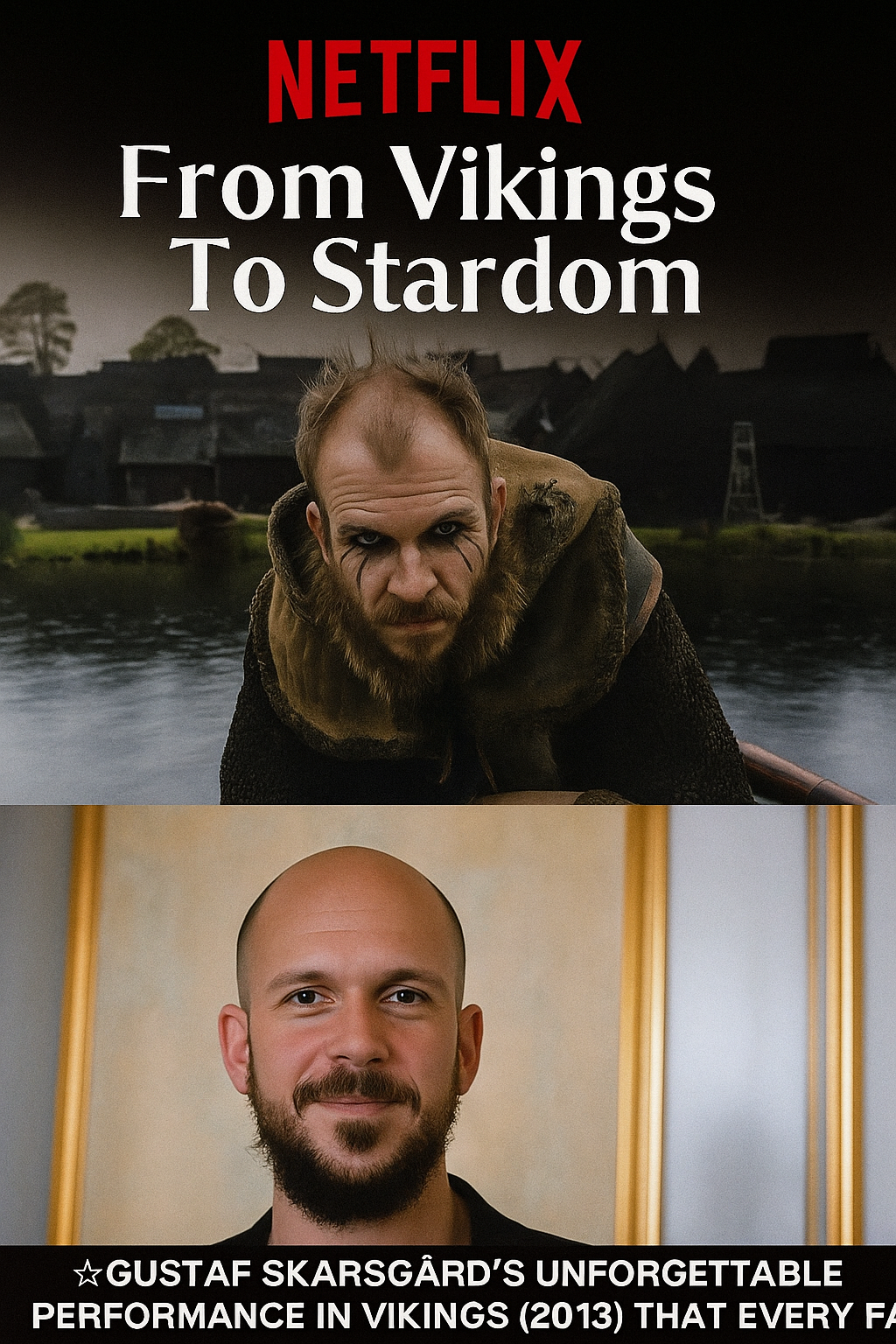When Vikings first premiered in 2013, it brought with it a wave of excitement, adventure, and gripping drama that quickly captivated audiences around the world. At the heart of this legendary historical series was an ensemble of remarkable actors, but one who stood out with undeniable magnetism was Gustaf Skarsgård. His portrayal of Floki, the eccentric shipbuilder and spiritual compass of the Viking tribe, not only defined a crucial element of the series but also cemented his reputation as one of the most versatile and dynamic performers of his generation.
Skarsgård took on a role that could easily have slipped into caricature. Floki, with his painted eyes, erratic movements, and mischievous grin, could have been nothing more than comic relief. But Gustaf elevated him far beyond that. Through his nuanced acting, he created a complex figure—a man both deeply loyal and dangerously unpredictable. Viewers could sense both the warmth of his devotion to Ragnar Lothbrok and the chilling darkness of his jealousies and violent impulses. It was this duality that made Floki unforgettable and Gustaf’s performance so compelling.
What separated Gustaf from many of his peers was his ability to transform completely into the role. He did not simply play Floki; he inhabited him. From the way he walked with exaggerated but deliberate motions to the way he tilted his head in moments of contemplation, every detail of his performance was meticulous. He embodied the spirit of the Viking age while at the same time adding layers of humanity and vulnerability that made Floki relatable. Fans could not help but feel conflicted—both loving and fearing him.
The series itself provided an ideal stage for Gustaf’s talents to shine. With sweeping landscapes, brutal battles, and intense political rivalries, Vikings demanded performances that matched its scale. Gustaf, however, did not just match the grandeur—he added texture. In scenes filled with chaos, his presence anchored viewers. Whether he was standing silently in the background with eyes darting in suspicion, or erupting in fits of laughter that masked inner torment, he commanded attention without stealing it unnecessarily from others. He made Floki essential to the fabric of the story.
Fans who followed the series noticed how Gustaf’s performance evolved across the seasons. In the early years, Floki was playful and cunning, a mischievous spirit who brought lightheartedness even amid bloodshed. But as the story unfolded, Gustaf guided the character into darker territory. Betrayals, losses, and crises of faith shaped Floki, and through it all, Gustaf delivered heart-wrenching emotional depth. His ability to portray grief, madness, and redemption in such raw authenticity showcased his rare gift for capturing the human condition.
Perhaps one of the most remarkable aspects of his performance was how it blurred the line between sanity and madness. Gustaf played Floki as someone whose eccentricity was both his strength and his downfall. His faith in the old gods bordered on obsession, his laughter often seemed like the fragile mask of a tortured soul, and his loyalty often crossed into dangerous fanaticism. For audiences, this made him unpredictable, and unpredictability is the key ingredient of great television.
What makes Gustaf Skarsgård’s performance so essential to the legacy of Vikings is the emotional investment he demanded from viewers. Love him or hate him, nobody could ignore Floki. The character sparked conversations, debates, and even divided fans, which is the ultimate sign of a powerful portrayal. A character that lingers in the audience’s mind long after the credits roll is one that is truly immortalized, and Gustaf achieved exactly that.
Beyond the series, Gustaf’s work in Vikings elevated his international profile, bringing him recognition far outside Scandinavian cinema. The show introduced him to millions of viewers globally, and his performance left many eager to follow his career into new roles. While the Skarsgård family is already well known for producing remarkable acting talent, Gustaf carved his own unique path, distinct from his famous siblings, by embracing a role that was daring, unusual, and unforgettable.
For new viewers who may be considering whether or not to watch Vikings, Gustaf’s performance alone is reason enough to dive in. The series offers gripping narratives, epic battles, and historical intrigue, but it is the human performances that give it heart. Floki is one of the most iconic characters of the saga, and experiencing Gustaf Skarsgård’s evolution in the role is a journey that no fan of quality acting should miss.
For long-time fans, reflecting on Gustaf’s work is a reminder of the kind of artistry that television is capable of. He turned a supporting character into a fan favorite, ensuring that Floki’s legacy would be inseparable from the success of the series itself. His performance became a cornerstone of what made Vikings resonate so strongly with audiences and critics alike.
As the years pass, and as new shows attempt to capture the same level of immersion, Gustaf Skarsgård’s work in Vikings will continue to be revisited and celebrated. It stands as a benchmark for how an actor can transform a role into something greater than the script, something timeless and alive. His Floki is not just a character in a television series—he is a legend brought to life with extraordinary passion.
In the end, Vikings would not be the same without Gustaf Skarsgård. His unforgettable performance defined the essence of unpredictability, loyalty, and madness that made the story so riveting. For anyone who has yet to see it, or for those willing to revisit it, Gustaf’s Floki remains one of the greatest reasons to watch Vikings. He did not just play a role—he gave us a character who will live forever in the annals of television history.



